On The Wellbeing of University Faculty
by Johnrev Guilaran
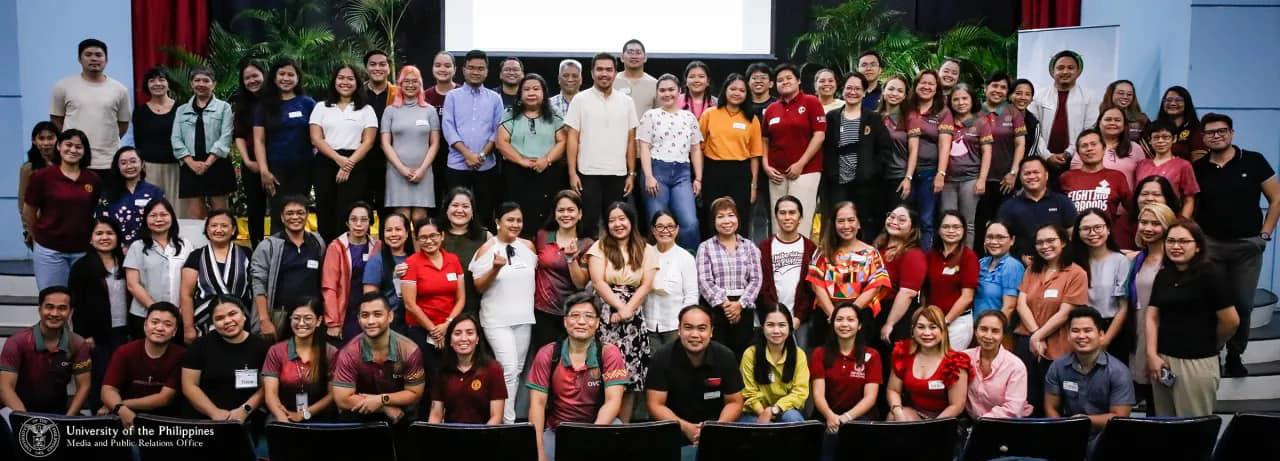
Higher education is becoming more competitive. This changing zeitgeist within academia characterized by focus on global rankings and becoming more market-driven pushes universities to demand more from the faculty. In effect, this increases what is asked of faculty members, from rapid institution of new degree programs, to increasing research output and extension services, without necessarily increasing their resources to meet these demands. Increasing demands in faculty functions (i.e., teaching, research, service) have been found to be associated with burnout (Dinibutun et al., 2020; Sabagh et al., 2018), especially during the COVID-19 pandemic (e.g., Taylor & Frechette, 2022).
The pandemic exposed a lot of cracks in our system. In the midst of quickly shifting to remote modalities of teaching, research, and public service; accommodating demands from both students and administration; and, negotiating with the salience of sickness and death during the time of COVID-19, many faculty members struggled to stay afloat. It dawned on us that while there have been systems in place to take care of student wellbeing, those measures intended for faculty wellbeing were left wanting. For instance, while students have guidance services specialists, faculty members, especially in small constituent units, had to look for professionals outside the university to address their mental health concerns.
Without a doubt, there is a need to address faculty wellbeing issues in the University. A place to start would be to first examine how we understand wellbeing, which is often narrowly appreciated. Wellbeing
encompasses being happy, healthy, and satisfied with life, which are influenced by both individual and environmental factors. It includes having a sense of meaning and a sense of connection, and the ability to manage stress. However, a lot of us talk about wellbeing as exclusively within the domain of the individual. This becomes a problem when we exclusively assign wellbeing within the province of the individual—and delegate them to be solely responsible for it—and remove any accountability from their environment. We usually talk about wellbeing in the University as something that is just in the mind, and that being happy and satisfied with your life is just a matter of perspective regardless of context. In fact, context plays a crucial role in wellbeing.
In the university context, five predictors have been identified to promote faculty wellbeing (Larson et al., 2019). One is chairperson support, which includes the manner of decision-making, how the chair sets priorities, how these priorities are being communicated to the faculty, how the chair evaluates their work, and how work is rewarded. Another is administration support (e.g., university president, chancellor, vicechancellors, deans). Support for research and instruction, which may include institutional support (e.g., ease in procurement processes, ample research dissemination grants, timely release of research funds) and instrumental support (e.g., attention to staffing patterns, availability of safe and comfortable classrooms, clerical support) also impacts faculty wellbeing. In addition, departmental support and feedback processes are also vital to wellbeing. These include student evaluation mechanisms; evaluation standards; feedback and
recognition on teaching, research, and public service work; and how the university, through its departments, supports worklife balance. Finally, support for promotion and tenure, which includes clarity of criteria and standards of evaluation, and the faculty member’s sense of upward mobility and professional growth within the university, also predicts faculty wellbeing.
These predictors point to a supportive university environment as a requirement for the promotion of faculty wellbeing. Decades of research on supportive behaviours (e.g., Cutrona, 1990; Rini & Dunkel Schetter, 2010) have prescribed that effective support needs to be responsiveness. Supportive behaviors need to address the recipient’s need for these behaviors to be effective. Help and support provided should match the quantity and quality of help needed. This also implies that not every action that is intended to support is actually supportive. A supportive university environment, then, is that which provides the faculty the resources to deal or cope with the challenges that they face, particularly those which are occupational in nature. At the very least, the university should not add to the demands of the job without providing resources to deal with these demands. Increasing job demands without the corresponding increase or improvement in job resources may lead to burnout (Mudrak et al., 2018).
These aforementioned factors may directly impact faculty wellbeing, but they may also influence core psychological needs of volitional autonomy, perceived competence, and perceived relatedness (Larson et al., 2019). What this means is that the university environment should be supportive of academic freedom, and should be protective of the safety of faculty members to think and act independently, and voice out (dissenting) opinions without fear of harassment or retribution (i.e., volitional autonomy). The university environment should be empowering and should promote a sense of control and mastery of their academic environment (i.e., perceived competence). The university environment should foster a sense of belongingness and collegiality (i.e., perceived relatedness). The satisfaction of
2 UP KALIPUNAN FEBRUARY 2024
UP Sectoral Regents with delegates of UP System Mental Health and Well-Being Summit held in UP Los Baños on October 11-12, 2023. UP Media and Public Relations Office (MPRO)
these core psychological needs were found to predict wellbeing of faculty in higher education.
Wellbeing is also often discussed in relation to quality of life (QoL). To address faculty wellbeing, there may be a need to look into the different factors that contribute to QoL. These factors are adequate and fair compensation (e.g., sufficient income, income commensurate to amount and quality of work), safe and healthy working conditions (e.g., reasonable working hours in physically and psychologically safe environments), opportunities for continued growth and security (e.g., career development, faculty promotion, security of tenure), constitutionalism in the work organisation (e.g., academic freedom, right to due process), the social relevance in work life (e.g., the social relevance of teaching in the university), overall life space (e.g., reasonable work schedules, easy commute to work, availability of decent faculty housing), social integration and cohesiveness (e.g., having a sense of community, egalitarianism in the university), and human progress capabilities (e.g., being able to use skills and knowledge at work, having a sense of autonomy) (Mirkamali & Thani, 2011).
Some of these factors overlap with the faculty wellbeing predictors presented earlier. However, these QoL factors highlight the unique importance of economic dimensions of wellbeing and the overall living conditions of faculty members as integral components of quality of life vis-à-vis wellbeing.
We also refer to the concept of kaginhawaan to represent wellbeing (Samaco-Zamora & Fernandez, 2016). Dimensions of kaginhawaan include financial independence, psycho-emotional wellbeing, and spirituality. In many Visayan languages, ginhawa (the root word of kaginhawaan) is synonymous with breath, and having the time and space to breathe provides relief. Does the University provide enough opportunity for its faculty to breathe?
The faculty is the lifeblood of the university. As such, it should make the wellbeing of its faculty resources a priority. The literature already provides a good starting point from which deeper PAGE 4
Ugnayan at Ikot Unyon 2023: Mga Nalikom na Usapin at Isyu sa Buong UP System
ni Rommel Rodriguez
Katuwang ang Opisina ng Rehente ng Kaguruan ng Unibersidad ng Pilipinas (UP) sa programa nitong Ugnayan (Usapang Pamantasan at Bayan), isinagawa ng All UP Academic Employees Union ang regular nitong Ikot Unyon sa iba’t ibang constituent university ng UP. Sa pamamagitan ng bukas na talakayan at pagbabahagi ng mga guro at REPS sa iba’t ibang CUs, nalikom ang ilan sa mahahalagang usapin at hamon na kinakaharap ng mga guro at REPS sa pamantasan sa kasalukuyan.
Mahalaga ang mga talang ito sa patuloy na pagdokumento ng OFR at ng unyon sa maiigting na usaping paulit-ulit na inihahain ng mga empleyado ng unibersidad sapagkat kalimitan ay walang kongkretong tugon sa mga usaping ito. Narito ang nalikom na mga usaping marapat pagtuunan ng pansin ng administrasyon upang mabigyang-solusyon ang mga ito sa lalong madaling panahon:
1. Kakulangan ng mga Plantilla Items
Hanggang sa kasalukuyan, nananatiling pinakamalaking suliranin ng Unibersidad pagdating sa employment ang kakulangan ng items kapwa sa kaguruan at mga REPS. Ang karaniwang paraan ng administrasyon upang kagyat itong tugunan ay mas malaan ng mga posisyong lecturer, teaching fellows at teaching asssistants para punan ang kakulangan ng mga guro sa iba’t ibang CUs. Samantala, nananatiling malaking porsiyento ng ating REPS sa buong UP System ay mga kontraktuwal at job order ang istatus na employment.
2. Overworked, underpaid
Dahil sa kakulangan ng mga plantilla items, madalas ang mga pagkakataon na sinasalo ng mga guro at REPS ang mga pangangailangan ng units sa pagtuturo, pananaliksik hanggang sa administratibong gawain. Hindi sapat ang ratio ng mga guro
Wellbeing | From page 3
conversations with corresponding actions may germinate. With UP’s “commitment to the freedom and welfare of all” (University of the Philippines, 2019), the University should start from home and institutionalize measures that protect the freedom and promote the welfare of its constituents, including the faculty. A way to start would be the creation of standing committees that safeguard academic freedom, provide safety and security, facilitate growth and upward mobility, and ensure that the university addresses issues of faculty welfare. It is important that the faculty member must still be at the forefront of taking care of their wellbeing. However, it is imperative that the university provides them with the resources to do this, especially for aspects of wellbeing connected with their functions as faculty members.
In matters concerning wellbeing, the faculty have often been left to fend for themselves. With the increasing demands of life in academia, and the changing discourse on mental health and welfare, the university should not let faculty wellbeing fall between the cracks.
Dr. Johnrev B. Guilaran is a UP Scientist and the Chairperson of the Division of Social Sciences in UP Visayas.
at REPS sa sinersebisyuhan mga estudyante at iba pang sektor sa Unibersidad.
3. Rebyu sa mga akademiko at administratibong patakaran
Sa pag-ikot sa iba’t ibang CUs ng UP, natukoy sa bawat pagbabahagi na kailangan ang malawakang rebyu sa mga akademiko at administratibong programa at patakaran ng pamantasan na may direktang epekto sa employment status ng mga guro at REPS. Kailangang maging inclusive ang mga patakaran para maiwasan ang pagsasantabi ng kasamang guro at REPS na di nakakatupad sa itinakdang mga pamantayan, partikular sa usaping tenure at promosyon.
4. Enabling environment
Napakaraming hinihiling ng kasalukuyang administrasyon sa mga guro at REPS sa usapin ng pagututro at serbisyo sa pamantansan. Subalit sa huli, sa pamamagitan ng mga bahaginan sa mga CU
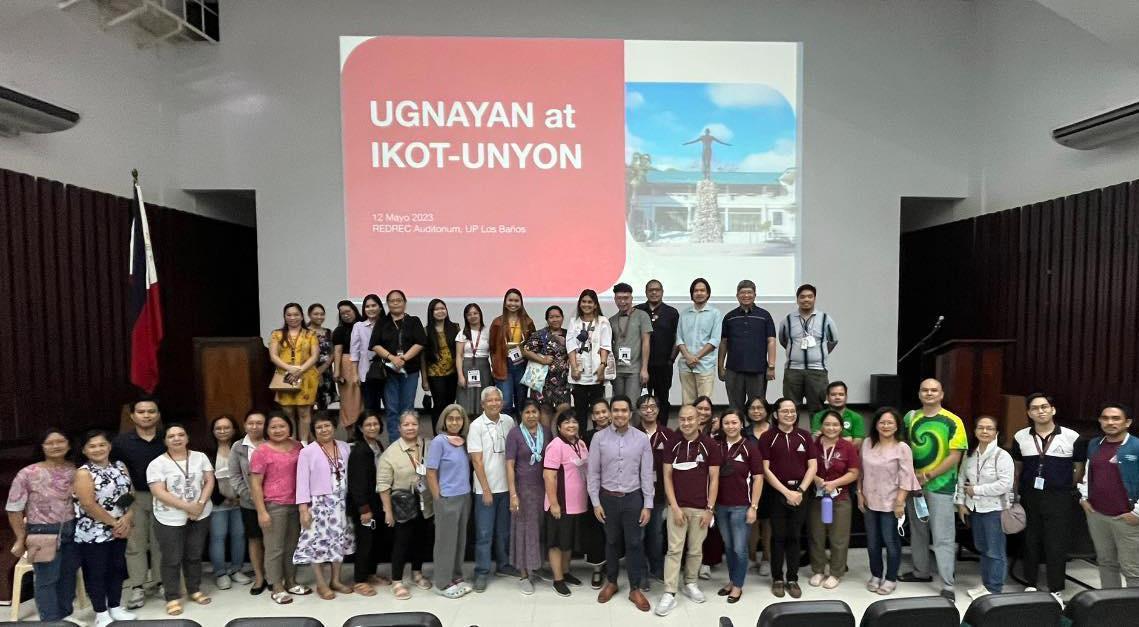
References
Cutrona, C. E. (1990). Stress and social support--In search of optimal matching. Journal of Social and Clinical Psychology, 9(1), 3–14. https://doi.org/10.1521/jscp.1990.9.1.3
Dinibutun, S. R., Kuzey, C., & Dinc, M. S. (2020). The Effect of Organizational Climate on Faculty Burnout at State and Private Universities: A Comparative Analysis. SAGE Open, 10(4), 215824402097917. https://doi.org/10.1177/2158244020979175
Larson, L. M., Seipel, M. T., Shelley, M. C., Gahn, S. W., Ko, S. Y., Schenkenfelder, M., Rover, D. T., Schmittmann, B., & Heitmann, M. M. (2019). The Academic Environment and Faculty WellBeing: The Role of Psychological Needs. Journal of Career Assessment, 27(1), 167–182. https:// doi.org/10.1177/1069072717748667
Mirkamali, S. M., & Thani, F. N. (2011). A Study on the Quality of Work Life (QWL) among faculty members of University of Tehran(UT) and Sharif university of Technology (SUT). Procedia - Social and Behavioral Sciences, 29, 179–187. https://doi.org/10.1016/j.sbspro.2011.11.223
Mudrak, J., Zabrodska, K., Kveton, P., Jelinek, M., Blatny, M., Solcova, I., & Machovcova, K. (2018). Occupational Well-being Among University Faculty: A Job Demands-Resources Model. Research in Higher Education, 59(3), 325–348. https://doi.org/10.1007/s11162-017-9467-x
Rini, C., & Dunkel Schetter, C. (2010). The effectiveness of social support attempts in intimate relationships. In K. Sullivan & J. Davila (Eds.), Support processes in intimate relationships (pp. 26–67). Oxford University Press.
Sabagh, Z., Hall, N. C., & Saroyan, A. (2018). Antecedents, correlates and consequences of faculty burnout. Educational Research, 60(2), 131–156. https://doi.org/10.1080/00131881.20 18.1461573
Samaco-Zamora, M. C. F., & Fernandez, K. T. G. (2016). A Grounded Theory of Filipino Wellness (Kaginhawaan). Psychological Studies, 61(4), 279–287. https://doi.org/10.1007/ s12646-016-0373-7
Taylor, D. G., & Frechette, M. (2022). The Impact of Workload, Productivity, and Social Support on Burnout Among Marketing Faculty During the COVID-19 Pandemic. Journal of Marketing Education, 44(2), 134–148. https://doi.org/10.1177/02734753221074284
University of the Philippines. (2019, November 28). UP Statement of the Philosophy of Education and Graduate Attributes. https://up.edu.ph/wp-content/uploads/2021/08/ Approved-UP-Statement-of-Philosophy-of-Education-and-Graduate-Attributes.pdf
4 UP KALIPUNAN |
Ugnayan, konsultatibong pagpupulong ng Opisina ng Faculty Regent sa Unibersidad ng Pilipinas Los Baños, Mayo 12, 2023 a REDREC auditorium.
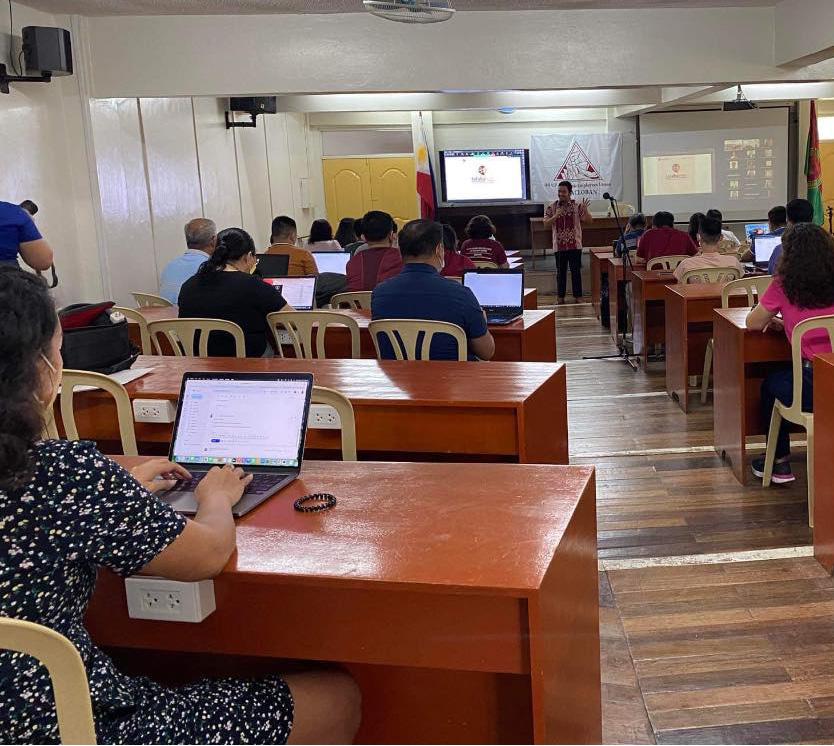 Ugnayan sa Unibersidad ng Pilipinas-Tacloban noong Mayo 22, 2023.
Ugnayan sa Unibersidad ng Pilipinas-Tacloban noong Mayo 22, 2023.
naging malaking usapin na upang maiskatuparan ng mga guro at REPS ang kanilang partikular na mga gawain at responsibilidad, mahaaga ang suporta mula sa administrasyon. Sa pamamaraan man ito ng sapat na pasilidad sa pagtuturo, pananaliksik, at gawaing ekstensiyon hanggang sa pagpapataas ng mga ranggo partikular ng mga empleyadong nakapaloob sa pinakamababang rank sa pamantasan.
5. Mental na kalusugan
Ang hamon sa mental na kalusugan ng empleyado ay higit na tumindi at naging matinding usapin lalo na noong pandemya. Sanhi ng konteksto ng pandemyang COVID, kaliwa’t kanan pagkakasakit at kung minsan, kamatayan ng mga mahal sa buhay, labis na naapektuhan ang katatagan ng pag-iisip ng mga guro at REPS. Sa huli, kahit natapos ang pandemya, malaking suliranin pa rin ito na marapat tugunan ng administrasyon.
6. Pasilidad at kalagayan ng mga gusali
Naging matingkad din na usapin ang kalagayan ng mga pasilidad at gusali sa ilang CUs. May mga kampus na hindi pa lubusang natatapos ang mga gusali kung kaya’t hindi nagagamit. Maraming dahilan ang ibinibigay ng mga administrador, mula sa kakulangan ng budget hanggang sa teknikal na mga usaping tulad ng kawalang permit sa pagtayo ng gusali. Sa huli, ang mismong mga sektor ng CU ang labis na naaapektuhan.
7. Grievance procedure
Nakapaloob sa ating Collective Negotiation Agreement na marapat magsagawa ang ating unyon katuwang ang administrasyon ng grievance training procedure upang matukoy ang epektibong mga pamamaraan
Thrown into the Open Sea --- The Frailties of Our Faculty Development Program
I
’ve spent quite a significant amount of time in the University to have seen many faculty members return from their pursuit of graduate degrees. Often, those who have taken their degrees abroad return with diplomas, while those who pursued them domestically are forced to come back still burdened with completing their dissertations or master’s theses. Regardless of whether or not they completed their degrees, many faculty members return from graduate studies with elevated blood pressures, higher risks for diabetes, receding hairlines, poorer vision, and debilitating mental health issues. Yet, few openly talk about the factors that contributed to their deteriorating health conditions.Recently, I found myself in an informal gathering with fellow faculty members. Many of us were deeply immersed in our PhD programs, some had completed their degrees, and one was planning to pursue theirs.
Soon enough, each one of us began sharing personal struggles. One recounted how he was hospitalized due to stress amid a 13-unit semestral load, another experienced a literal nosebleed during his final exam, and yet another expressed that we should no longer be surprised if we see them mindlessly picking up stones while singing to themselves on the street. I disclosed my own anxiety, as someone who has never really been hung up on grades, about receiving any grade other than an uno fearing that it would imply I wasn’t giving my best effort.
The University offers financial support for those undertaking graduate studies. Under the UP Visayas Local Fellowship, for example, PhD candidates are granted four years of paid study leave. Additionally, we receive free tuition at other UP constituent units, a monthly stipend of PhP5,000, book allowance of PhP1,000 per regular semester, and round-trip economy airfare per semester.
Beyond this financial support, many of the faculty members I’ve spoken with note that their interactions with their Chair/Dean primarily revolve around submitting grades, justifying study progress, or providing a list of accomplishments to defend the renewal of study leave privileges.
“Kumusta ka?” almost always translates to, “How soon can you finish so that you can come back to doing your job?”
In Academic Personnel Committee meetings, studying faculty members are often referred to as investments, classified as good or bad, with university administrators seeking returns on them as soon as possible. This reeks of commodification of education, where faculty members are dehumanized and viewed merely as cogs in a system designed to produce labor-ready students.
For many of us who attended UP in undergrad, being thrown into the proverbial open sea is not new. Struggling in college was considered normal, even worn as a badge of honor by some. However, floundering as a professional in an ocean that smacks you with one soul-crushing wave after another is an entirely different ordeal. It becomes even more daunting when you are trying to keep your head above water and instead of words of encouragement, all that’s being thrown your way are various forms of intimidation that drag you further into despair.
Faculty members pursue advanced degrees to become better professors of knowledge and facilitators of learning. The mental and emotional toll of pursuing these degrees is already substantial. However, being left to fend for oneself without support is an issue that cannot be ignored. The university must do better in ensuring that the academic development of our faculty members do not come at the expense of their health and emotional wellbeing. Only then can we truly cultivate an environment where both faculty and students can thrive.
[UP academic personnel may reach out to AUPAEU for concerns on faculty welfare.]
Early Sol A. Gadong, a Palanca awardee, teaches Mathematics at the Division of Professional Education in UP Visayas

Butil ng dugo ang hamog sa Gaza ni Emmanuel V. Dumlao
Inuulan ng apoy ang Gaza, dapat daw tupukin ang mga ipis na nakapuslit at naghasik ng lagim sa Lupang Pangako. Dapat dalisayin ang tribung pinili at iniibig ni Yahweh.
sa talaksan ng lasuglasog na mga bangkay, naghahanap ng kahugpong na bisig. Masdan: batang nakahandusay sa guho, nakatulala sa nagliliyab na langit, sa luha niyang nawalan ng lakas na dumaloy, kumikislap ang poot ng Estadong palangga ng Pentagon.
Dr. Emmanuel V. Dumlao is a faculty of the Department of Humanities of UP Los Baños, and former President of the All U.P. Academic Employees Union - Los Baños Chapter.
Pakinggan: kumakatok –duguang kamao, nangungulila; FEBRUARY 2024 5
PAGE 7
by Early Sol A. Gadong
Tipunan | p. 1
Proposed changes in the FRSP guidelines include the transfer of the general supervision of the Faculty Regent selection process from the Office of the Vice President for Academic Affairs to the OFR, which will initiate the creation of a Systemwide and CU-level committees.
Open campaigning, lecturers’ right to nominate and vote, and the de-clustering of smaller CUs in the two-year selection round,

among others, were also adopted during the meeting.
Meanwhile, on-site delegates and online participants
Fascists seek to stifle campaign for salary increase
by Noe M. Santillan
During the 17th Congress, the Makabayan Bloc filed House Bill No. 7211 to upgrade the salary grade and increase the Personnel Economic Relief Allowance of public school teaching and non-teaching staff on February 20, 2018. The House Bill had eighty co-authors. As early as February 26, 2018, the bill was referred to the Committee on Appropriations. Other than the salary grade upgrading, the bill’s aim to increase the monthly Personnel Economic Relief Allowance from Php 2,000 to Php 5,000 could have been a meager mitigation to inflation but the bill fell on deaf ears while salaries of police and military personnel doubled through Joint Resolution 1 (2018).
The Salary Standardization Law failed to retain teachers as it gave only a meager increase to most teachers from Teacher I to Teacher III.
The Makabayan Bloc refiled corresponding bills during the 18th and 19th Congress: House Bill 5990 on January 22, 2020 and House Bill 203 on the first day of the 19th Congress.
The previous administration had the “super majority” in the House, yet it did not mobilize for a substantial salary increase for education workers. Even House Bill 5990 was unable to gain ground from the committee review. Will refiling be the same scenario in the upcoming 20th Congress? In his presidential campaign, Pres. Ferdinand Marcos Jr. claimed he was aware of the teachers’ plight. But teachers can no longer wait for the President to fulfill his promises. The situation calls for a militant mass movement that would be more aggressive in advancing legislation for economic and welfare rights.
With teachers’ salaries neglected, many are leaving the country. Without a militant teachers’ movement pushing for House Bill 203, the Congress will see the seemingly ad infinitum refiling of House Bills.
Adding to the predicament is the terror-tagging of the progressive lawmakers. It instills fear in the rank and file of teachers to amplify the legislative measures that they can reap benefits from. Militarist methods like surveillance and profiling of progressive teachers obstruct the advancement of teachers’ rights.
Also adding to the teachers’ problem is Education Sec. and VicePres. Sara Duterte’s aggressive bid for confidential funds. However, the campaign against the confidential funds was not as splashy as the campaign for salary grade upgrades. Little attention, too, was given to calls for upholding UNESCO standards in allocating budget to the education sector, while decreasing the budget for the military.
While militarists continuously threaten progressives and undermine the teachers’ movement, many teachers have yet to join the campaign for salary grade upgrading. This, unfortunately, leaves an impression that fascists are winning in instilling fear among teachers. Our task is to reach more teachers and strengthen our campaign.
Noe M. Santillan teaches Social Sciences and Philosophy at the UP High School Cebu.
unanimously endorsed the proposal to institutionalize a UP Committee on the Promotion and Protection of Academic Freedom and Human Rights to protect its constituents, partner communities, organizations, and individuals amid the country’s
worsening political and human rights situation.
Faculty Regent Ramota plans to present the adopted Tipunan proposals to the Board of Regents and University of the Philippines President Angelo Jimenez. Office of the Faculty Regent
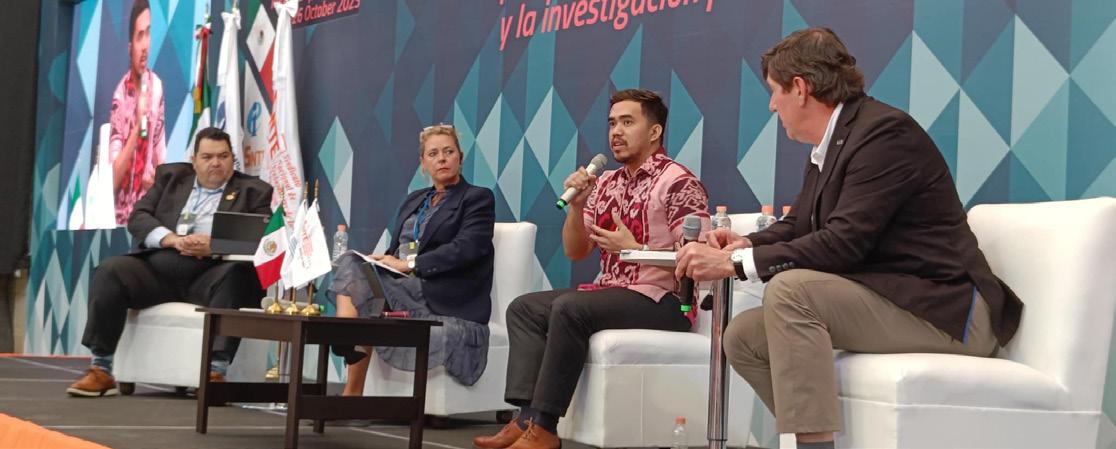
Academic freedom | p. 1 and products of their academic functions.”
In its 86th meeting, UP Baguio’s UC supported the creation of the Committee, citing the “disturbing surge in threats directed towards progressive individuals, including academic union leaders and dedicated faculty and student activists who champion socio-political, economic, environmental, and cultural causes” in Northern Luzon.
UP Visayas’ UC in October also noted “attempts by state forces to silence dissent,” with its faculty admonishing the university administration to provide “institutional protection for its own constituents.”
The University Councils in UP Los Baños and UP Mindanao also voted for the CAFHR’s creation in November.
“At the heart of the university is the exercise of academic freedom, and the affirmation of its role as catalyst of change. Academic freedom is at the locus of democratic governance and public service,” Faculty Regent Ramota said.
He added that as national university, UP must protect academic freedom amid disinformation, historical distortion, and disregard of people’s rights.
The proposal for the establishment of CAFHR was adopted in the systemwide Tipunan assembly organized by the Office of the Faculty Regent in February. It became a multisectoral initiative with the Faculty, Staff, and Student Regents, university unions, and student groups starting a series of dialogues with the university administration as early as April. Office of the Faculty Regent
6 UP KALIPUNAN FEBRUARY 2024
Members of the faculty from different constituent universities attended the Tipunan systemwide assembly in UP Manila organized by the Office of the Faculty Regent on February 2, 2023.
Faculty Regent Carl Marc Ramota joined the plenary on “Reclaiming academic freedom” at Education International’s 12th International Further and Higher Education and Research Conference on October 25-27, 2023 in Mexico City.
tests and imaging
• An amount of Php 10,000 from eHOPE to be used maintenance medication
Finally, in April 2023, through the consistent intercession of the sectoral regents, the UP Board of Regents approved three of the recommendations: increase in financial coverage of eHOPE to Php 100,000 across all CUs, expansion of eligibility to avail of eHOPE, and increase in payment for professional fees. But other urgent amendments, like the inclusion of out-patient services and lab exams and the maintenance medication in eHOPE coverage, were left out.
Much still needs to be done to make eHOPE more relevant for UP employees. Data shows that from 2017 to 2021, three CUs comprised 80% of the beneficiaries: UP Manila/PGH 41%; UP Diliman 22%, and UP Los Baños 17%. Utilization year on year hovered from PhP 18 to 22 million (assuming 2021 to be an outlier due to the pandemic). Thus, despite UP’s allocation for eHOPE, there was significant underutilization due to the programs’ provisions.
The Office of the Faculty Regent, together with the faculty and REPS throughout the university through the AUPAEU, continues to push for not just the approval of the remaining recommendations to expand the eHOPE but also for reforms that will ensure the health and wellness of everyone within the UP community. Challenges remain but the struggle continues and the fight marches ever forward.
Dr. Gene A. Nisperos is a faculty of the Department of Family and Community Medicine in UP Manila, and former President of the All U.P. Academic Employees Union - Manila Chapter
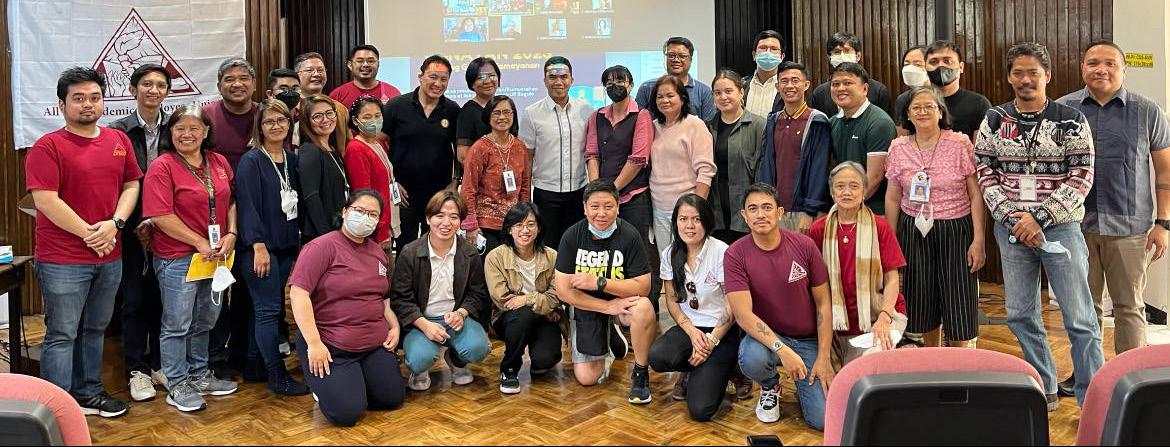
Ugnayan at ikot unyon | p. 5
upang mabigyang resolusyon ang mga hinaing at hindi pagkakaunawaan ng mga kapwa empleyado at administrador. Sa bahagi ng unyon, naisagawa na natin ang isang grievance training workshop at kasalukuyang tinitipon ang resulta nito at mahahalagang datos at tala para sa agaran nitong pagsasakatuparan.
8. Demoktratiko at konsultatibong pamamahala
Nailatag din ng mga guro at REPS ang kahalagahang isulong ang demokratiko at konsultatibong pamamahala ilang CUs. Mahalagang maging transparent ang mga administrador sa kanilang mga polisiya at patakaran. Marapat tiyakin na hindi sila nagsasantabi ng mga sektor at hindi inaabuso ang pansamantalang hawak na kapangyarihan dahil sa posisyon.
9. Pagpapatupad ng Collective Negotiation Agreement
Sa pag-ikot sa buong UP System, palaging inihahain ng nakasamang mga guro at REPS ang halaga ng pagpapatupad ng CNA sa pagitan ng administrasyon at unyon. May ilan pa ring administrador ang tila hindi batid na marapat tumalima
sa mga nilalaman ng CNA, partikular sa usapin ng committee representation kapwa sa antas system at CU.
10. Akademikong Kalayaan
Sa nagdaang mga taon, patuloy ang pandarahas, paniniktik at pananakot ng mga puwersang militar at pulisya ng estado sa mga guro, unyonista’t mga mag-aaral ng uinibersidad. Maigting ang panawagan ng iba’t ibang sektor ng UP upang isulong ang pagbuo ng komite sa unibersidad na mangangalaga sa akademikong kalayaan at karapatang pantao ng mga miyembro ng komunidad ng Unibersidad.
Hanggang sa kasalukuyan, binibitbit ng AUPAEU ang mga usaping may kaunayan sa benepisyo, kapakanan, at kagalingan ng mga guro, REPS, at kawani ng U.P. Sa nangdaang mga buwan ng taong 2023 hanggang sa kasalukuyan, naging matatag ang ugnayan ng unyon at OFR upang isulong ang mga panawagan at kampanyang higit na nakabubuti sa nakararaming empleyado ng Unibersidad ng Pilipinas.
Si Dr. Rommel B. Rodriguez ay guro ng malikhaing pagsulat sa Kolehiyo ng Arte at Literatura ng UP Diliman, at National Vice President for Faculty ng All U.P. Academic Employees Union.
Office of the Faculty Regent Engages in Consultation for Faculty Regent Selection Guidelines Revision
by Dr. Janette Malata-Silva
On February 2, 2023, the first Tipunan, a system-wide consultative meeting on campaign initiatives and proposals on democratic university governance, was held through the initiative of Faculty Regent Carl Marc L. Ramota.
During the same meeting, the committee tasked by the Office of the Faculty Regent (OFR) to revisit the existing guidelines on faculty Regent Selection Process (FRSP) presented the proposed amendments to the FRSP guidelines. Among the recommended
amendments are the following:
• Revision of the nomination criteria to consider the nominee’s experience and knowledge on policy making that support faculty rights and welfare.
• Exclusion of UP System and CU officials as possible nominees to avoid potential conflict of interest.
• Inclusion of part-time, temporary, and substitute faculty/lecturers in the pool of those who can vote for a more inclusive participation and representation.
• Creation by the OFR of System-level and CU-level committees to oversee the
selection process.
• Provision to allow open campaigning so voters are given the opportunity to learn more about the nominees’ background and plans.
The Committee members who were tasked to present these amendments were Dr. Caster Palaganas of UP Baguio, Assoc. Professor Janette H. Malata-Silva of UPLB, and Prof. Consuelo Habito of UP Open University.
FEBRUARY 2024 UP KALIPUNAN 7
eHOPE | p. 3
Dr. Janette H. Malata-Silva is the Vice Chancellor for Student Affairs of the University of the Philippines Los Baños.
Nagtungo ng UP Baguio si Faculty Regent Carl Marc Ramota noong Abril 25, 2023 para sa UGNAYAN, kasama ang mga opisyal ng All U.P. Academic Employees Union na nagsagawa rin ng Ikot Unyon para sa mga miyembrong REPS at faculty.
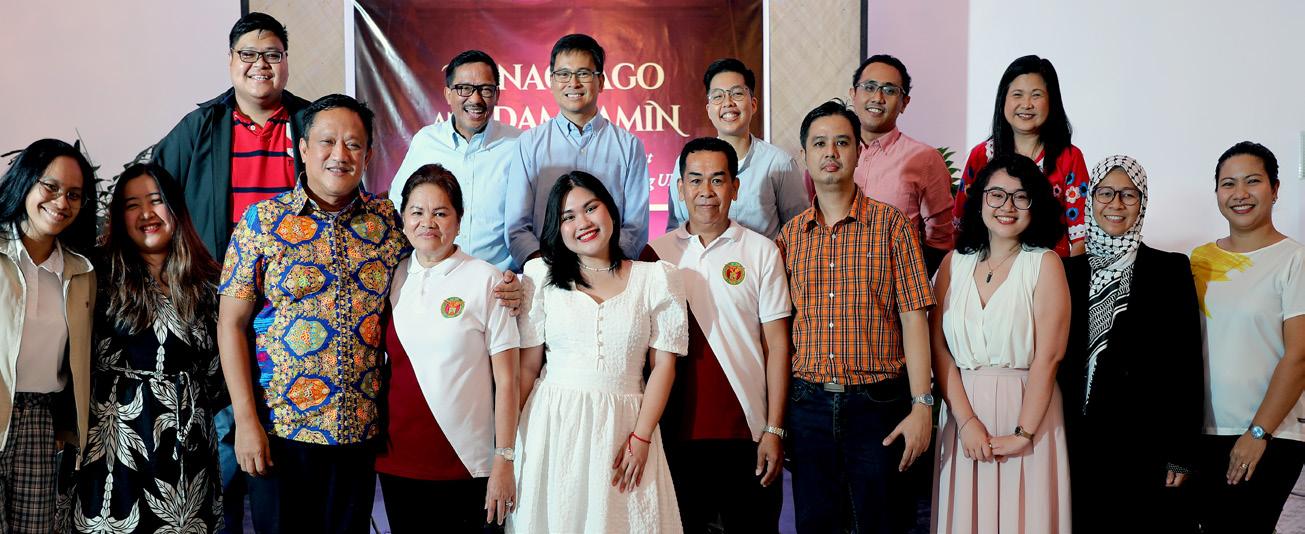
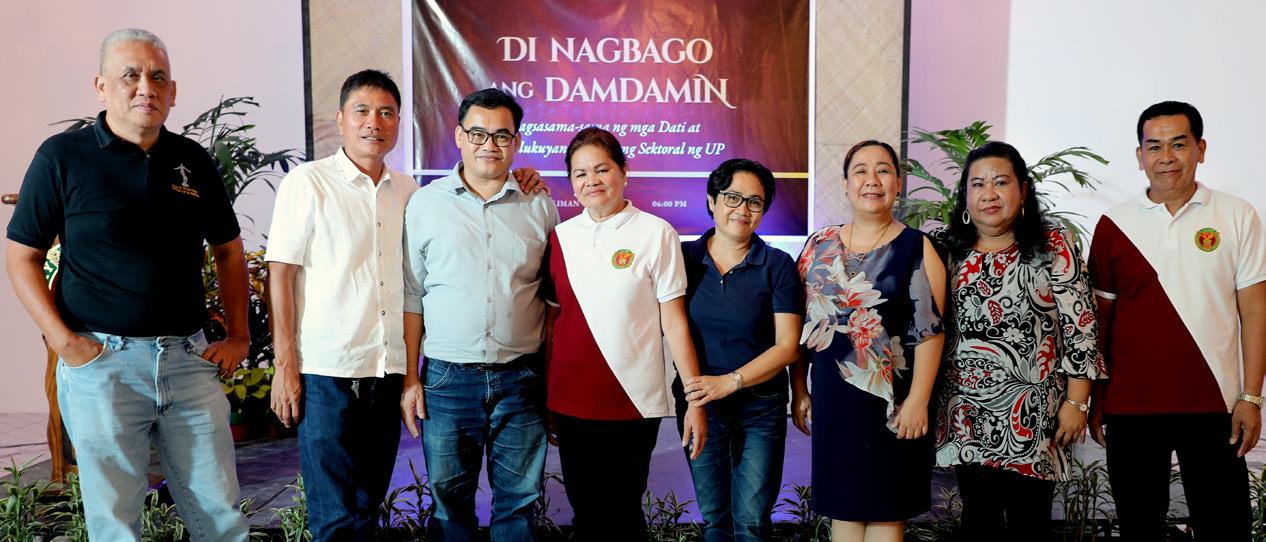
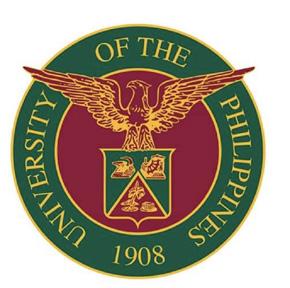



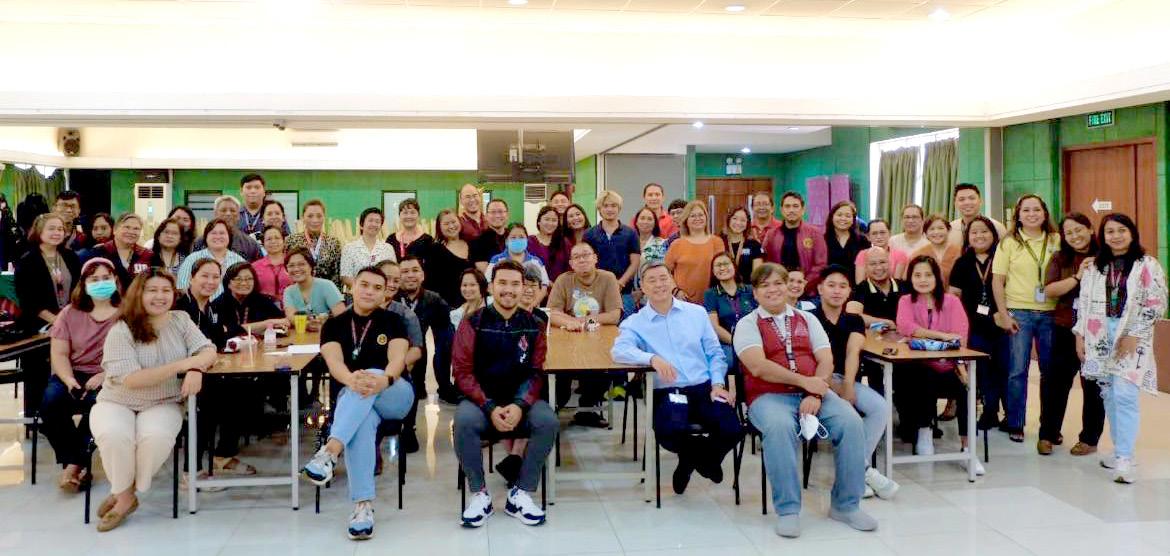


 Ugnayan sa Unibersidad ng Pilipinas-Tacloban noong Mayo 22, 2023.
Ugnayan sa Unibersidad ng Pilipinas-Tacloban noong Mayo 22, 2023.









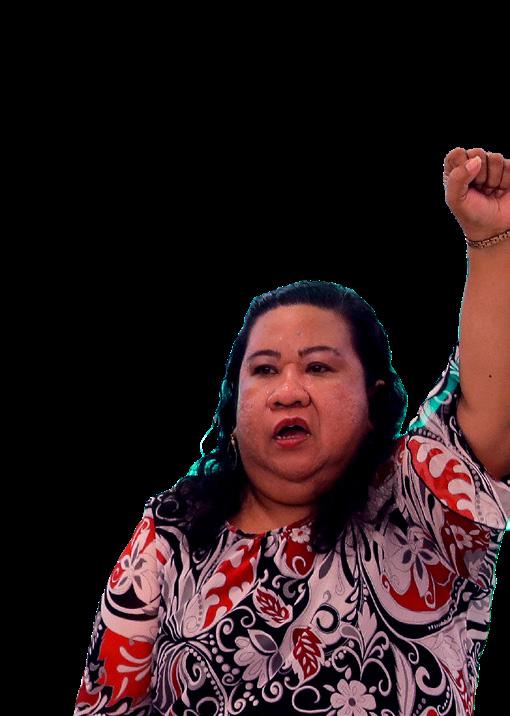


 RIGHT: Student Regent Sofia Jan Trinidad, Faculty Regent Carl Marc Ramota, and former Staff Regent Victoria Belegal sing the last lines of the “UP Naming Mahal” with raised fists.
Former student regents with incumbent Student Regent Sofia Jan Trinidad (center), and long-time staff members Corazon Arcena and Rodrigo Cumpio.
Former staff regents and OSR administrative staff members.
Incumbent Faculty Regent Carl Marc Ramota and OSR’s Ms. Corazon Arcena with former UP Faculty Regents: Ramon Guillermo, Lourdes Abadingo, Francisco “Dodong” Nemenzo, Lourdes Barcenas, Roland Simbulan, and Judy Taguiwalo.
Photos: UP Media and Public Relations Office
RIGHT: Student Regent Sofia Jan Trinidad, Faculty Regent Carl Marc Ramota, and former Staff Regent Victoria Belegal sing the last lines of the “UP Naming Mahal” with raised fists.
Former student regents with incumbent Student Regent Sofia Jan Trinidad (center), and long-time staff members Corazon Arcena and Rodrigo Cumpio.
Former staff regents and OSR administrative staff members.
Incumbent Faculty Regent Carl Marc Ramota and OSR’s Ms. Corazon Arcena with former UP Faculty Regents: Ramon Guillermo, Lourdes Abadingo, Francisco “Dodong” Nemenzo, Lourdes Barcenas, Roland Simbulan, and Judy Taguiwalo.
Photos: UP Media and Public Relations Office